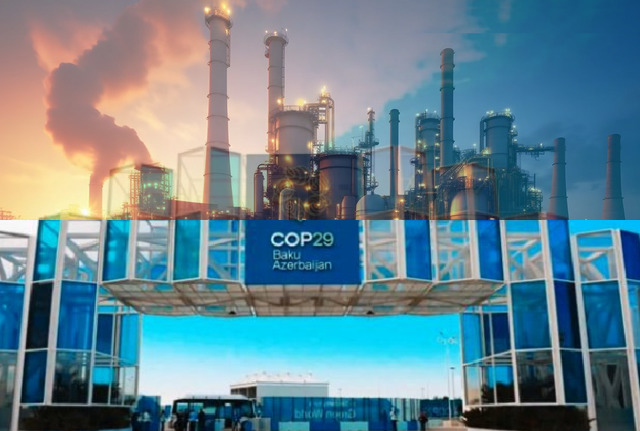
COP 29: God’s Gift Comes With A Price
COP 29 was everything that climate change warriors like to attack. It was hosted by Azerbaijan, an oil producing country whose economy is based on continuing dependency on fossil fuel by the world. Dismissing the anti-fossil fuel lobby, President Ilham Aliyev inaugurated the conference by saying that oil and gas are gifts of God. That statement sealed the dynamics of the conference between those seeking an end to fossil fuel and those whose lives are dependent on its persistent use. That’s the paradox. If fossil fuel production is halted, some countries will sink into poverty, but if it continues, the world could sink under climate disasters.
It didn’t help that this was the second year running an oil producing country hosted COP, the biggest gathering of climate change experts, policy-makers, influencers and NGOs among others. Over 50,000 people attended COP 29 at Baku, Azerbaijan.
Many attend COP sessions with a lot of expectations. But there are other dynamics and expectations. There are countries whose very existence depends on selling fossil fuels. An end to oil and gas will mean they will join the ranks of least developing countries.
There are countries whose existence is threatened by climate change. They lack the means and resources to take measures to protect their citizens. Floods, heat waves, forest fires, droughts etc destroy what developments they have had, what little they can cling to. Some Island nations fear they will be drowned by rising sea levels.
Then there are big economy countries like China and India who are trying to meet the needs of their citizens. Their development requires large amounts of fossil fuels to reach their targets.
It is a complex situation which cannot be seen in the binary of fossil fuel or no fossil fuel politics. The alternatives have a long way to go before fulfilling the need of the human race, including those who most ardently want an end to fossil fuels. Their flights are dependent on fossil fuels and their home heating is dependent on gas. Fossil fuels cannot simply disappear overnight or even in a few years.
It is after all oil and gas that have been the engines of human progress in the last two centuries. They are responsible for development, comfort and also wars.
The president of Azerbaijan made a rhetorical statement that oil and gas are Gift of God. Given the immense development human race has achieved in the last two centuries, it is not far from the truth. However, somebody should have added that like all gifts, it can come with a price. Gifts come with expectations. If not handled with care and frugality, gifts can burn.
What is missing at COP is a realistic approach to climate change. Countries dependent on fossil fuel industry need to start thinking of alternative industry and economic activity. As developed countries shift to non-fossil fuel sources, perhaps the price of oil can increase to such levels that reduction in production will not affect their economies. There is still plenty of oil and gas in the ground. Greed could push some of these countries to continue production at their current level to increase their revenues even further.
ALSO READ: Climate Changes Comes Calling
What is clearly needed is economic modelling at COP on a systematic reduction in fossil fuel production but sustainable economies for fossil fuel producing countries. Given the extravagance of countries like Saudi Arabia and UAE or even Azerbaijan, it is difficult to see why they will not resist any attempts at COP to reduce production. They have more than enough money to buy influence. Their eagerness to host COP meetings and then derail the targets was widely commented on.
Hence there is focus on adaptation, seeking ways for human kind to adapt to climate change. There is only so much that can be done with adaptation. The human lungs and body are not a fast evolving machine that will filter carbon and nitrous oxide from the air to ensure a clean filtered intake for a healthy body. The earth and environment is on an even slower evolutionary process. It cannot suddenly battle the climatic effects of increased pollutants in the atmosphere.
The natural ecological balances that have evolved over millions of years to absorb carbon, to ensure Oxygen production, to prevent mass erosion of soil, to avoid frequent floods, to maintain temperatures at levels that life is sustainable, cannot be engineered to suit the excessive spewing of pollutants in the air, desertification following deforestation, ecological disasters following massive reduction or even extinction of some species and extremes of climate.
COP is quite a charged political gathering. There are emotive campaigns that prophesize end of human life as we know it basing it on science, massive natural disasters if we continue down the current path of so called development and progress and then there are those who see poverty, economic disasters and hardship if the world really accedes to the demands of some high profile climate campaigners. NGOs and countries.
Focussing on mitigation, adaptation and loss and damage can only do so much. Putting money, albeit reluctantly, into adaptation and protecting developing countries from ravages of climate change can do so much. There seemed to be a gap in COP 29 which is felt but not yet articulated. The gap perhaps is the question — what is the alternative economic model of development that can pull the world away from fossil fuel economy to alternatives yet preserve the advantages that some regions of the world have from fossil fuel economy? What are developmental models that developing and least developing countries can adopt that will help them to lift their standards of living without fossil fuels?
The politics at COP can move forward constructively if countries like Azerbaijan who think oil and gas are God’s gift, if not to humanity at least to their country, can be persuaded to move on from fossil fuel economy to other models that protect their standard of living and wealth.



